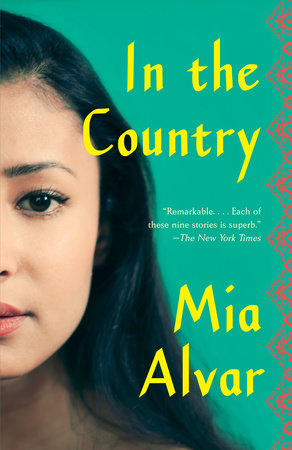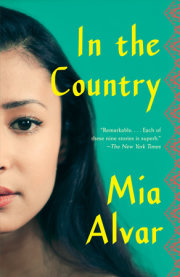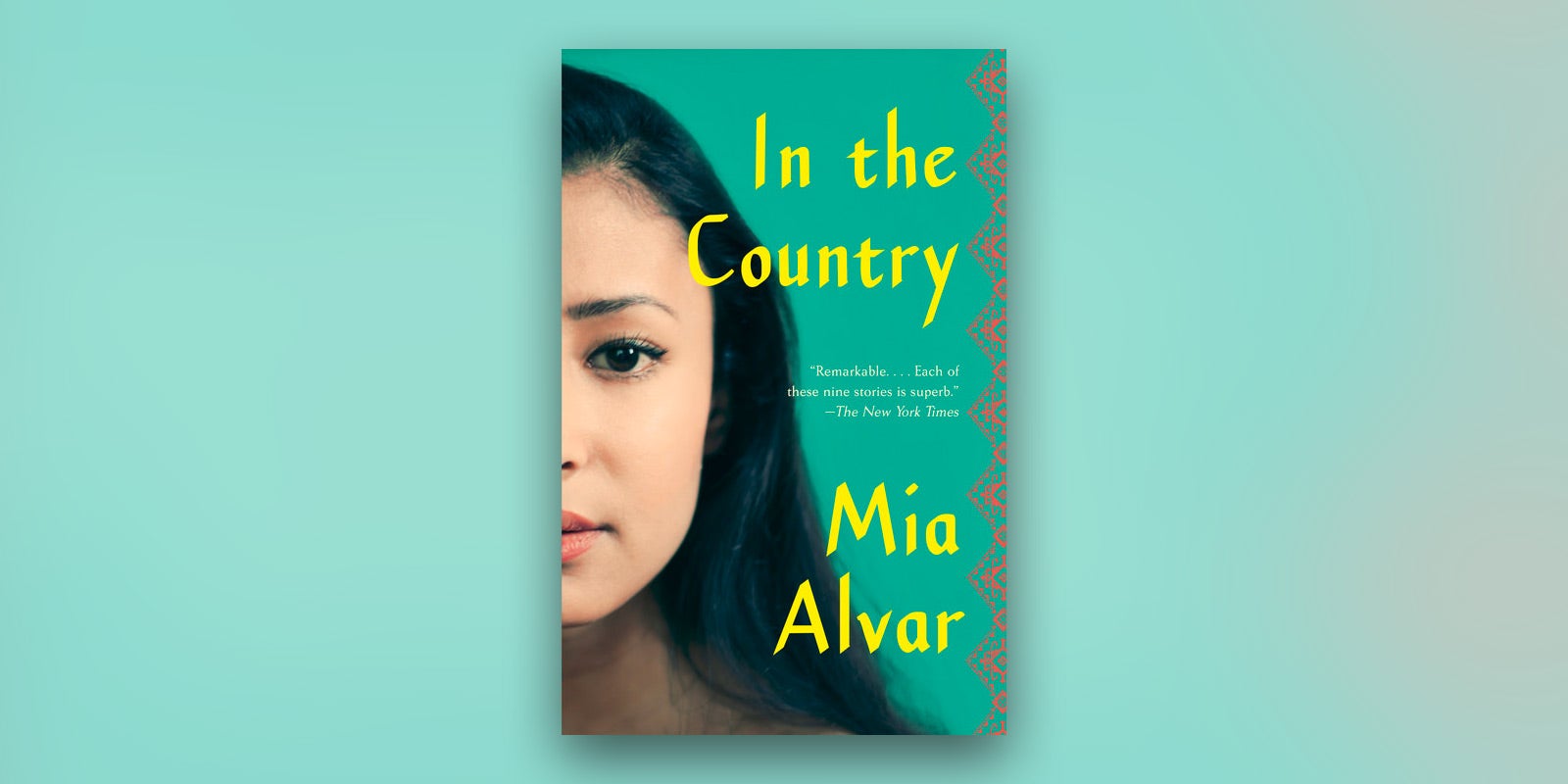Winner of the PEN/Robert W. Bingham Prize for Debut Fiction
A Best Book of 2015: Publishers Weekly; Kirkus Reviews; Huffington Post
These nine globe-trotting, unforgettable stories from Mia Alvar, a remarkable new literary talent, vividly give voice to the women and men of the Filipino diaspora. Here are exiles, emigrants, and wanderers uprooting their families from the Philippines to begin new lives in the Middle East, the United States, and elsewhere—and, sometimes, turning back again.
A pharmacist living in New York smuggles drugs to his ailing father in Manila, only to discover alarming truths about his family and his past. In Bahrain, a Filipina teacher drawn to a special pupil finds, to her surprise, that she is questioning her own marriage. A college student leans on her brother, a laborer in Saudi Arabia, to support her writing ambitions, without realizing that his is the life truly made for fiction. And in the title story, a journalist and a nurse face an unspeakable trauma amidst the political turmoil of the Philippines in the 1970s and ’80s.
In the Country speaks to the heart of everyone who has ever searched for a place to call home. From teachers to housemaids, from mothers to sons, Alvar’s powerful debut collection explores the universal experiences of loss, displacement, and the longing to connect across borders both real and imagined. Deeply compassionate and richly felt, In the Country marks the emergence of a formidable new writer.
“Twists abound in Mia Alvar’s debut collection. But Alvar’s finely wrought shocks, delivered in exacting prose, reverberate without easy resolution. . . . Worlds continue to be upended as [her] characters move among the Philippines, the Persian Gulf and the United States. The Manila-born, New York-based author offers deft portraits of transnational wanderers, blessed and cursed with mobility. . . . Alvar’s incursion into Filipino politics recalls Jessica Hagedorn’s novelDogeaters, and Miguel Syjuco’s Ilustrado. . . Clearly a writer with enchanting powers, Alvar wills us to crisscross the globe with [her characters] all over again.” —The New York Times Book Review
“Compulsively readable . . . thanks to Alvar's expansiveness and her gift for grounded, human-scale metaphors. . . . Each of In the Country's nine stories about the Filipino diaspora has the satisfying heft of a little novel. In precise and patient prose, Alvar reveals the complex patterns of labor migration that structure and define her characters' most intimate relationships.” —Chicago Tribune
“Emotionally ambitious. . . . Alvar hits the ground running. . . . What will make readers want to remain in the tired and sad company of Alvar's workers and wanderers is her own gorgeous writing style. Each one of the nine stories in this collection riffs on the theme of exile; yet, every main character's situation is distinct, morally messy in a different way, and unpredictable. Alvar is the kind of writer whose imagination seems inexhaustible, and who stirs up an answering desire in her readers for more and more stories. . . . Alvar is reportedly working on a novel . . . which is great news, because as a reader and a new fan, I want more and more and more.” —Maureen Corrigan, “Fresh Air,” NPR
“A stunning debut—without ever getting overly sentimental, page after page of In the Country is laced with . . . revelatory, unflinching truth. . . . Mia Alvar comes out swinging for the fences in her powerful first story collection about the Filipino diaspora—often exiled even at home—and doesn’t ever let up.” —San Francisco Chronicle
“Remarkable. . . . Each of these nine stories is superb.” —The New York Times
“Haunting and powerful. . . . Extraordinarily adept and insightful. . . . [Alvar] moves gracefully among Philippine cultural iconography and Tagalog, Bahraini class structure, American anachronisms, shifting gender and sexuality, and political histories. . . . The title story, ‘In the Country,’ and the longish ‘Old Girl’ stand out as evidence of Alvar's sensitive gaze, literary talent and polycultural dexterity. . . . Alvar is gifted; of that there is no doubt. And she has important things to say. She knows how to make the reader pause, and think deeply, feel. And hunger, as I am already, for more.” —The Plain Dealer
“[An] accomplished debut of longing and redemption. In lush, sinuous sentences, Alvar probes the enduring stain of race, colonialism, and especially class, giving voice to all strata of Philippine society.” —O, The Oprah Magazine
“Superbly affecting. . . . Nine stories, all of them so smoothly and successfully realized that it seems incredible that this volume is [Alvar’s] fiction debut. . . . [Her] speciality [is] the smart depiction of lives lived between two worlds. . . . [Alvar has] a range that would be the envy of authors with 10 books under their belts.” —The Christian Science Monitor
“Alvar’s debut story collection is so well-drawn and plot-rich that you almost wish it were a novel. But then Alvar wouldn’t have been able to cram in so many disparate voices and painful ironies: a New York pharmacist smuggling drugs on flights back home to palliate his dying father; a set of housewives in Bahrain who throw parties for their poorer landspeople; an office cleaner in the World Trade Center in the summer of 2001.” —New York Magazine
“Magnificent. . . . Debut story collections don’t come much better than this. In the eight complex tales and one ambitious novella of In the Country, Filipina-American author Mia Alvar proves herself a tough, sophisticated writer with a canny empathy for the quandaries that confront her intricately layered characters.” —The Seattle Times
“Perfect for anyone who thinks they can’t get down with short stories. . . . While the subject matter is indeed fresh, the real appeal belongs to the lush sentences, rapid pacing, and morally conflicted characters. The last and title story is a novella-length tale that Alvar is reportedly using as fodder for a novel. We can only hope.” —The Miami New Times
“It's difficult to reduce Alvar's stunning short story collection to just one idea. Her book, as Walt Whitman might say, contains multitudes—not just because of its varied settings, from the Philippines to the U.S. to Bahrain, but because every character is different, and portrayed with love and a rare kind of understanding. These are people who have little to nothing in common with one another, except that they're all trying to find a home, and it's always a more challenging task than anyone would expect. . . . Alvar finds beauty in the unlikeliest of places, and that's what makes In the Country such an inspired, remarkable book. Her characters, even the lucky ones, are never far from affliction, and never really close to home, even when they've lived in the same place their whole lives. Alvar finds triumph in the torment and deliverance in the agony. . . . Pain, of course, never needs an invitation, but welcoming it anyway can maybe teach us something great about ourselves—as great as the stories in this impressive debut.” —NPR.org
“In a strong debut, Alvar brings to life a range of Filipino experiences that resonate both with the power of a unique identity and the universal wisdom of human experience.” —Huffington Post
“Alvar’s openings are so skillful that you can’t help wanting to know what comes next. . . . You want to know who these people are, telling you their stories in seductive first-person voices. . . . Alvar’s stories feel as richly imagined as any novel; like Alice Munro, she can convey an entire life in only a few pages, and she also sees the deep connections between people of difference classes and backgrounds. I can’t wait to see what she does next.” —Laurie Muchnick, Kirkus Reviews
“Stunning. . . . Dach story feels as rich, as deep, and as crafted as a novel. Equally impressive is the confident fluidity with which Alvar moves from Manila to Bahrain to Tokyo, from 1971 to 1986 to the 21st century. . . . Throughout Alvar’s stories, the language is as elegant as it is durable, while the lines of class, race, gender, and history are both blurred and crystallized.” —Publishers Weekly (starred review)
“In the Country is filled with graceful, carefully crafted stories—each one a world unto itself. I was so happy to see this collection, as I’ve been a fan of Mia Alvar’s from the start.” —Nathan Englander, author of What We Talk About When We Talk About Anne Frank
“Mia Alvar's graceful and gutsy stories are rich with an all-too-rare quality in fiction: a keen sense of the wider world and how the searching, indelible characters that populate this collection fit within it. In the Country is a spectacular debut from a vital new talent.” —Laura van den Berg, author of The Isle of Youthand Find Me
“So assured and so wise, these stories feel like classics already. Mia Alvar maps the inner lives of her characters as precisely and as beautifully as she does the disparate landscapes where these complicated lives unfold.” —Karen Thompson Walker, author of The Age of Miracles
“With a lyrical grace similar to the stories [of] Jhumpa Lahiri and a psychological acuity we find in Yoko Ogawa’s novellas, here is a talented new voice named Mia Alvar. The stories she’s written are the kind that can make a difference, the kind that can hold a fist up to your heart without letting go of their hold on you: the kind with a light inside of them, whispering all the while, ‘This is life. This is my heart and mind in the world.’ An extremely promising debut.” —Mario Alberto Zambrano, author of Loteria
“A superb debut collection that reads like the work of a seasoned writer. Mia Alvar illuminates the lives of her characters with such penetrating insight, wisdom, and compassion that it’s impossible not to experience their struggles and aspirations as your own. Even as it satisfies, In the Country leaves the reader hungry for more from this gifted, sensitive storyteller.” —Sigrid Nunez, author ofThe Last of Her Kind
“In the Country is an absolutely beautiful book—generous and heartbreaking, empathetic and insightful. Mia Alvar is an incredible storyteller, patient, assured and in utter control—every one of the endings in this gorgeous debut knocked me flat. A truly extraordinary collection of stories—I loved it.” —Molly Antopol, author of The UnAmericans
“It’s hard to believe that In the Country is Mia Alvar’s debut: her diamond prose sparkles so brightly and cuts so deeply. Each marvelous story shows us a facet of the Philippines at a distance—through the eyes of expats in Bahrain and Saudi, immigrants abroad and returning, and casual visitors—but what they illuminate most clearly is the distance between home and heart, and how our ties to the past can be simultaneously tenuous and tenacious.” —Celeste Ng, author of Everything I Never Told You
“Few writers, even the most seasoned, can produce collections of evenly superb stories. Mia Alvar triumphs on her first try. . . . Both intrepid readers and armchair tourists eager to explore debut narratives that straddle multiple countries and cultures—à la Violet Kupersmith’s The Frangipani Hotel or Rajesh Parameswaran’s I Am an Executioner—will be opulently rewarded here.” —Library Journal (starred review)







